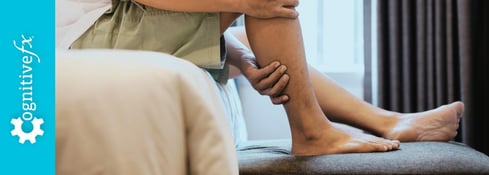Light sensitivity (photophobia) can manifest in different ways for different people. For example, you might:
- Get headaches or eye pain from exposure to any bright lights
- Tolerate most indoor lights, but hate fluorescents
- Feel the need to wear sunglasses indoors
- Be okay during the day, but have your symptoms triggered by the lights from other cars when you’re driving at night.
In this post, we’ll cover the causes of sudden onset light sensitivity (i.e., light sensitivity that you haven’t experienced continually since birth). After going through possible causes, we’ll do a deep-dive on the kind of light sensitivity you might experience after a concussion.
If you’re not sure if you’ve actually had a concussion, read this guide on how to know if you’ve had a concussion.
Many of our patients with post-concussion symptoms experience light sensitivity and other vision-related symptoms. Head injury is a common cause of light sensitivity, but many patients don’t know why or how that happens. So, we’ll explain:
If you’re experiencing light sensitivity and other symptoms that won’t go away after a concussion, we can help. On average, our patients improve by 75% after treatment. To learn about diagnosis and treatment options, schedule a consultation.
Note: Any data relating to brain function mentioned in this post is from our first generation fNCI scans. Gen 1 scans compared activation in various regions of the brain with a control database of healthy brains. Our clinic is now rolling out second-generation fNCI which looks both at the activation of individual brain regions and at the connections between brain regions. Results are interpreted and reported differently for Gen 2 than for Gen 1; reports will not look the same if you come into the clinic for treatment.
What Causes Light Sensitivity?
This section is not a comprehensive discussion of all possible causes of photophobia. It’s intended for you to review the most common situations, figure out the underlying cause of your symptoms, and come up with a plan for what to do next.
Concussion
If you experienced a blow to the head, jostling, or whiplash, you may have sustained a concussion (even if you didn’t have symptoms immediately after the injury). A concussion is the same thing as a mild traumatic brain injury (mTBI).
If your light sensitivity appeared sometime after the concussion (even years later), then it could be related to that head injury. If you’re simultaneously experiencing other concussion or post-concussion syndrome (PCS) symptoms, it is even more likely your light sensitivity is concussion related. Other visual symptoms you could experience include double vision, blurry vision, and eye strain.
Light sensitivity from a concussion may last several weeks and could be “on” all the time or simply triggered by certain situations. If you have post-concussion syndrome (symptoms beyond the normal concussion recovery period), then your light sensitivity probably won’t go away without treatment.
If you think your photophobia could be connected to a concussion, jump to the part of the article where we discuss more about concussions and light sensitivity. You can also look for a vision therapist in your area to identify functional vision changes post injury.
Eye Issues
Even a small change in your eye can result in sensitivity to light. The following could all cause light sensitivity:
- Blepharospasm (spasm of the eyelids/involuntary blinking)
- Corneal abrasion (i.e., small scratches or cuts on your eye)
- Detached retina
- Dry eyes
- Eye infections (conjunctivitis)
- Irritation from contact lenses
- Sunburn (often from looking directly at the sun)
- Swelling (uveitis/iritis or keratitis).
Some eye conditions come with the risk of permanently damaged vision or vision loss. It’s important to see a vision specialist immediately for an eye exam if you believe your eye health is compromised. Most of these conditions can be diagnosed by any eye doctor, but an ophthalmologist (as opposed to an optometrist) will have more experience diagnosing complex issues.
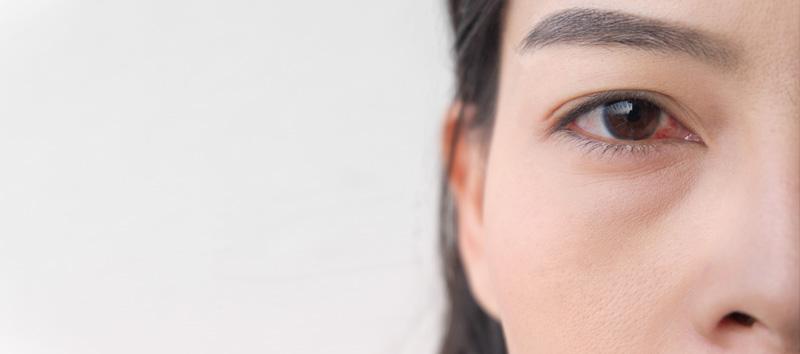
If you experience symptoms such as floaters (little dots that move around in your field of vision), flashes of light, or darkened vision, you could have a detached retina (but this is much less likely if your vision is otherwise normal and you don’t have a family history of that condition).
Many of these conditions are also associated with blurred vision.
Migraines
The association between migraines and light sensitivity (as we’ll discuss below) can sometimes be a chicken-or-egg question. If you experience them together, it may be that your migraines cause you to become light sensitive. Or, your light sensitivity may trigger the migraine.
Migraines can be related to a brain injury, genetic, environmental, or some combination thereof. If you only experience light sensitivity in conjunction with a migraine, then you likely don’t need to worry about the other causes of photophobia discussed here (like eye injury or diseases).
Diseases
A handful of diseases can cause photophobia. These will typically present with other common symptoms. Some possible culprits for your light sensitivity could be meningitis, pink eye (an infectious type of conjunctivitis), or herpes keratitis.
Preeclampsia, a medical condition during pregnancy, can also cause photophobia.
If light sensitivity is your only symptom, then none of these are likely the culprit.
Medications
Sometimes people develop light sensitivity as a side effect of a medication they’re taking. Have you started taking any new medications in the last few months? If so, you can talk to your pharmacist about whether those medications — or the combination of medications you’re taking — could cause photophobia.
These drugs have a possible light sensitivity side effect reported (taken from this list and this list; see them for more information):
Why Do Concussions Cause Light Sensitivity?
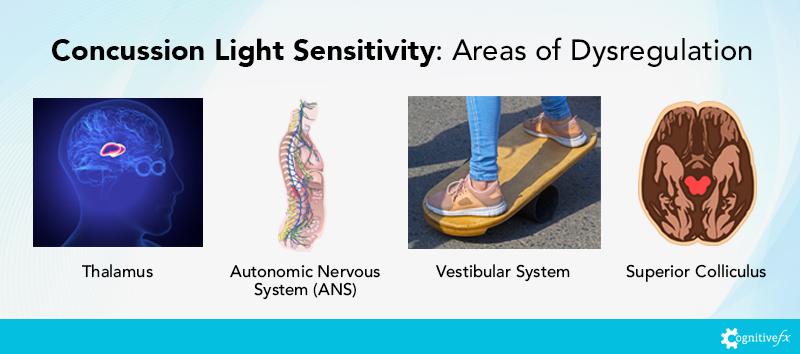
Could your sensitivity to light come from a head injury? If ...
- Your light sensitivity started after a hit to the head, severe jostling, or whiplash, and
- Your light sensitivity is persistent (i.e., it doesn’t disappear for good after you lie down in a dark room),
... then there is a distinct possibility your symptom stems from one or more concussions.
Concussion light sensitivity comes from dysregulation in one or more of these four key areas:
Thalamus
|
The thalamus is a region in your brain that acts as a filter for all visual information. In post-concussion syndrome, something called your neurovascular coupling can become dysregulated. Basically, the brain’s ability to use efficient communication pathways — and to summon the right amount of oxygen at the right times — can be compromised.
As a result, affected brain regions don’t always behave the way they should. If your thalamus isn’t doing its job, then your brain can be overwhelmed with too much visual information. Dark rooms have less visual information, so they feel more tolerable to patients.
|
Autonomic Nervous System (ANS)
|
Your autonomic nervous system governs a host of processes, including things like your heart rate, breathing, fight-or-flight response, blood pressure, and more. If it becomes dysregulated post-concussion, then it may cause your pupils to dilate more than they should. If that happens, your eyes let in too much light, resulting in light sensitivity.
That results in symptoms like being aggravated by fluorescent lights or headlights during nighttime traffic.
|
Vestibular System
|
Our brain uses three systems — our inner ear vestibular system, our sense of sight, and our sense of touch — to determine our position in space. It’s how you understand where you are relative to the things around you.
If your vestibular system is malfunctioning, it can cause a host of problems, such as car sickness, difficulty balancing, dizziness, and more.
It can cause light sensitivity if your brain registers a discrepancy between those systems. If your vestibular system tells your body one thing while your vision tells it another, your brain may increase sensitivity in one or more of those systems to compensate.
But increased sensitivity will quickly deplete your brain’s resources, making you tired and overwhelmed quickly — not to mention making you feel terrible from an overload of sensory information.
|
Superior Colliculus
|
Located in the midbrain, the superior colliculus is responsible for visual mapping and coordination with a few other senses. It helps you to orient yourself in space and has some control over the eye muscles.
If dysfunctional, it can increase sensitivity for multiple senses, especially vision.
|
Oftentimes, patients with light sensitivity will have problems with more than just one of the above-mentioned systems. Problems with one can trigger problems in the others, until it’s impossible to tease out which was the original culprit.
It’s also important to note that your light sensitivity doesn’t have to be “on” all the time to be from a concussion. Sometimes, it’s part of a symptom cascade. For example, you may find you’re only light-sensitive when you’ve had a stressful day and are exposed to a source of bright light (such as sunlight or fluorescent lighting).
Other patients find they can’t even stand incandescent light without sunglasses, no matter the status of their other symptoms.
Note: The good news is that these causes of light sensitivity are all treatable. We’ll discuss how that works further down the post. 95% of our patients experience statistically verified restoration of brain function. If you’d like to learn if you’re eligible for treatment at our clinic, you can request a consultation.
Common Symptoms Associated With Post-Concussion Syndrome Light Sensitivity
Some common symptom pairings patients experience are the following:
- Light and noise sensitivity
- Light sensitivity, migraines, and/or headaches
- Light sensitivity and dizziness.
Patients often want to know why those symptoms appear together. We’ve addressed each situation briefly below.
Light and Noise Sensitivity After a Concussion
It is extremely common for patients to experience light sensitivity and noise sensitivity together. Why?
These symptoms come hand in hand when your brain has increased sensitivity to sensory input (due to any one of the concussion-related causes named above). That increased sensitivity quickly tires you out and overwhelms your brain with too much information.
Light Sensitivity, Migraines, and Headaches

Light sensitivity can cause headaches and a feeling of pulling around the eyes, or eye strain. Both systems can be tired out by the overabundance of visual information, and that exhaustion is expressed as pain.
That said, headaches can also lead to light sensitivity if your brain is already dealing with overwhelm from post-concussion syndrome.
Light sensitivity can also be a migraine trigger or a warning symptom for migraine headaches, which could happen with increased frequency post concussion.
Because they are so interrelated, it’s often difficult to tell which one — light sensitivity or severe headaches — causes the other.
Light Sensitivity and Dizziness
Dizziness and light sensitivity occurring together could be from one of two situations.
First, it could be a problem with your vision. If what you see conflicts with what your inner ear and body are communicating to the brain, then you may feel disoriented in space, causing dizziness and, sometimes, loss of balance.
If it’s a problem with your vestibular system, that information may conflict with what your vision is telling your brain, also resulting in disorientation.
How Long Does Light Sensitivity Last After a Concussion?
The answer depends on how long it’s been since your concussion. For 90% of concussion patients, most symptoms will resolve within 2-3 weeks. That includes light sensitivity and any other eye problems you’ve experienced since the head injury.
But 10% of concussion patients experience lingering symptoms (aka, post-concussion syndrome) that typically will not go away without treatment. If you have post-concussion syndrome, your light sensitivity is unlikely to disappear.
In the next section, we’ll explain how diagnosis and treatment for post-concussion syndrome works.
Diagnosis and Treatment for Light Sensitivity After Concussion
If your light sensitivity comes from post-concussion syndrome, the best chance you have at symptom resolution is to be treated for PCS. This gets to the root of the issue rather than simply offering some coping mechanisms.
We’ve written a full-length post on how post-concussion syndrome is diagnosed and treated, so you can read that post for more detailed information. We’ll give you the short version below.
Diagnosis via fNCI
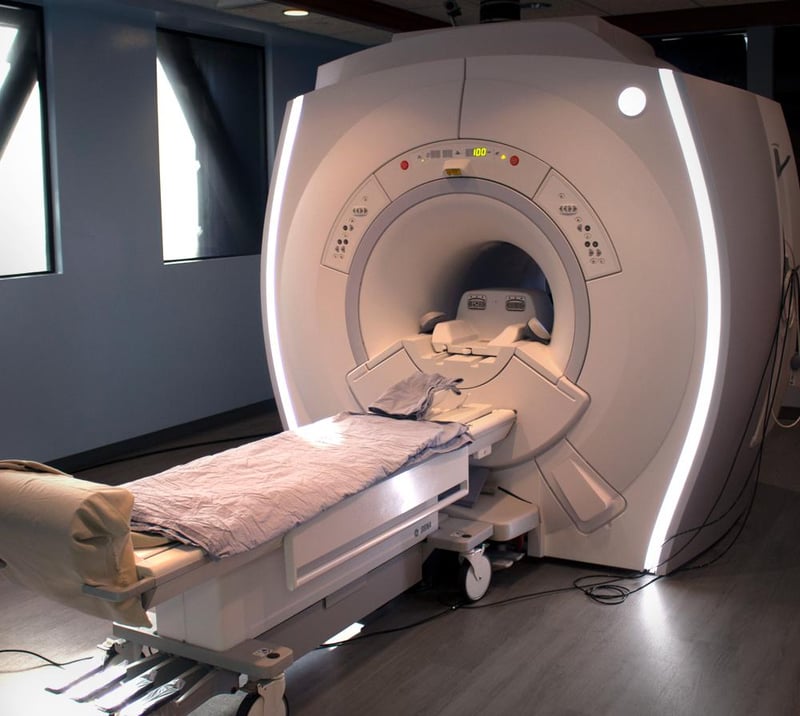
Our primary diagnostic tool is a brain scan called functional neurocognitive imaging (fNCI). It’s a type of functional MRI, which is a technology that allows us to see how the brain uses its resources. (This is not the same thing as a structural MRI, which many of our patients have had in the past without successfully identifying concussion dysfunction.)
By developing a standard testing methodology and comparing concussed brains to normal brains, we’ve been able to identify dysfunction due to brain injury, to a high degree of certainty. fNCI allows us to “see” which regions of your brain were affected by head trauma so we can tailor treatment to your needs.
We combine this information with your medical history, reported symptoms, and additional physical examination if needed. For example, if you’re having eye-related symptoms, we could look at your vestibular ocular reflex and your pupillary reaction. Oftentimes, we will refer patients with vision problems to Dr. Devin Duval, who specializes in diagnosing and treating eye problems caused by brain injury.
Treatment and At-Home Therapy
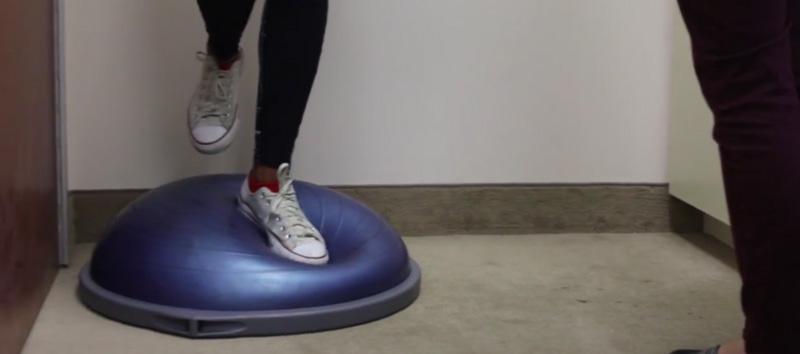
Treatment at Cognitive FX consists of physical and cognitive therapy. The exercises we give you challenge your brain to use more efficient pathways and to send enough oxygen — at the right time — to each part of your brain.
One of the best ways to learn what the treatment is like is to read what past patients have said about their experience. During treatment, therapists will teach you how to exercise safely, and you’ll experience a range of exercises in cognitive, physical, sensorimotor, and occupational therapies. Every patient meets with Dr. Spangler, a clinical psychologist, to make sure they’re well equipped for recovery.
At the end of treatment, patients undergo a second fNCI scan to see the changes that occurred in their brains. Then, we give patients a personalized exercise routine to follow at home, which involves physical and cognitive “homework” to help them keep improving.
What You Can Do in the Meantime
While treatment of post-concussion syndrome is ideal, there are some techniques you can use to cope in the meantime.
Sunglasses
While sunglasses outdoors are a must, sunglasses indoors can provide relief when you need it most. However, we do not recommend that you wear sunglasses indoors because it will reinforce the problem. Wearing them occasionally is safe, but wearing them all the time will just make recovery more difficult.
Colored Glasses
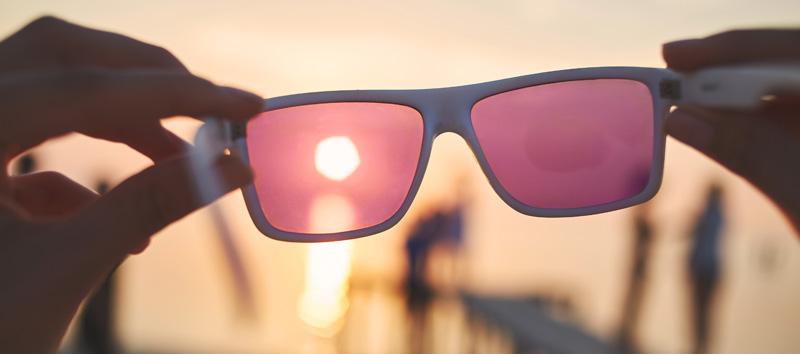
These are best introduced in vision therapy. Colored lenses can help significantly with symptom management because they reduce the amount of visual input (without eliminating incoming light). They make things a bit more manageable for your brain. You can use them more at first but will need to wean off them for a full recovery.
Limited Screen Time and Glasses That Filter Blue Light
Screen light isn’t great for anyone, let alone post-concussion patients! If you can, limit the time you spend in front of a phone or computer screen. It exposes you to even more visual input and can quickly overwhelm an already-taxed brain. If you have to spend time in front of a screen for work, consider getting glasses to filter out blue light. This should ease headaches and pain related to screen exposure.
Proper Posture During Phone Use
If you use your phone often, make sure it’s roughly 30 degrees below your horizontal vision level. If you bend your neck down while looking at your phone, that will restrict blood flow to your brain and hurt your neck (which, in addition to being problems of their own, can further aggravate vision symptoms).
Good Sleep Hygiene
This one’s tough, because sleep disruption is also a symptom of post-concussion syndrome. Many patients find it difficult, if not impossible, to get enough rest at night. Nevertheless, investing further in a good night’s sleep can help alleviate the severity of the light sensitivity and other symptoms you experience.
What If Your Light Sensitivity Is Getting Worse?
Based on models, the human retina would transmit data at about the rate of 10 million bits per second. That is roughly as fast as an ethernet connection (Koch et al., 2006). If something’s wrong with how your brain is receiving or processing information, that’s going to have ramifications elsewhere.
See a specialist and start troubleshooting. Unchecked light sensitivity could result in developing a migraine disorder, and it will definitely be aggravating to live with. And that’s assuming it’s not caused by a more serious condition.
If you’re experiencing light sensitivity and other symptoms that won’t go away after a concussion, we can help. On average, our patients improve by 75% after treatment. To learn about diagnosis and treatment options, schedule a consultation.








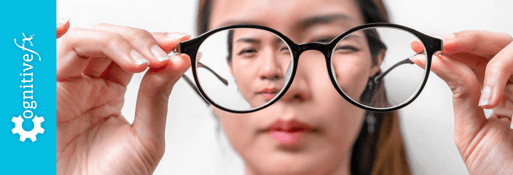




.png?height=175&name=Vision%20Problems%20After%20COVID%20Causes%20and%20Treatment%20(1).png)
